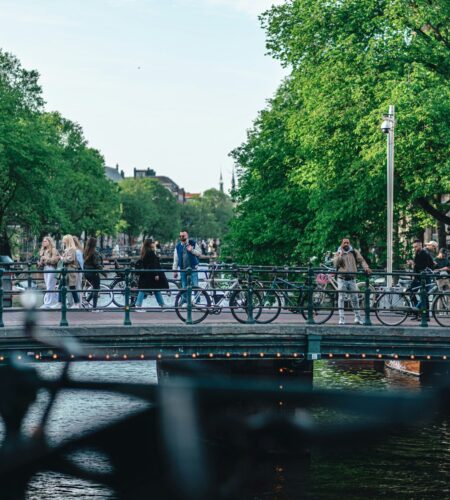When I first moved to Barcelona as a 22-year-old with nothing but a marketing internship and dreams bigger than my bank account, exploring Europe seemed laughable.
My monthly stipend barely covered rent and groceries, let alone train tickets to Paris or weekend getaways to Rome. But here’s what I discovered during my three years living abroad: being an expat with limited funds doesn’t mean you’re stuck in one city.
It just means you get creative. By the end of my European stint, I had visited 18 countries, slept in castles and monasteries, eaten my way through local markets, and collected enough stories to last a lifetime.
The total damage? Less than what most people spend on a single week-long vacation. If you’re living the expat lifestyle or planning budget travel through Europe, this guide will show you exactly how I made it work.
These aren’t theoretical tips from someone who traveled for two weeks—these are battle-tested strategies from someone who made Europe their playground while earning entry-level wages.
The Foundation: Mindset Shifts That Changed Everything
Think Like a Local, Not a Tourist
The biggest mistake I see fellow expats make is approaching Europe trips with a tourist mentality. Tourists pay premium prices because they have limited time and unlimited FOMO. Expats have something far more valuable: flexibility.
Instead of rushing through Paris in three days, I spent a month there, house-sitting for a French couple I met through a Facebook group.
Rather than booking expensive hotels in Prague, I volunteered at a hostel in exchange for free accommodation. The city became my temporary home, not just another stamp in my passport.
Embrace Slow Travel
Speed costs money. The faster you want to move, the more you’ll pay for flights, trains, and accommodation. My most expensive trips were the rushed weekend getaways where I flew from Barcelona to London on Friday and back on Sunday.
My cheapest adventures? The month I spent island-hopping in Greece, taking overnight ferries, and staying in small guesthouses.
The month I house-sat in rural Italy, I grocery shopped at local markets and cooked every meal. These weren’t just budget wins—they were the experiences that shaped my understanding of European culture.
Transportation: Moving Across Borders Without Breaking the Bank
Master the Art of Slow Trains
Everyone knows about budget airlines, but regional trains became my secret weapon. The trick isn’t just booking cheap tickets—it’s understanding how European rail systems work.
In Germany, I discovered regional day passes that let you travel unlimited distances for under €25. Perfect for exploring the Bavarian countryside or hopping between cities along the Rhine.
In Italy, I learned that regional trains don’t require reservations, meaning you can be spontaneous without paying penalty fees. My biggest transportation hack? The Interrail pass is used strategically.
Instead of the classic “10 countries in 14 days” approach, I bought a two-month pass and used it for longer journeys while walking or biking within cities. This turned expensive long-distance travel into a fixed cost I could budget around.
Hitchhiking: The Lost Art That Still Works
Yes, people still hitchhike in Europe, and yes, it’s generally safe if you use common sense. I hitchhiked through the Scottish Highlands, across rural France, and down the Croatian coast.
Not only was it free, but I met incredible people—a retired teacher who gave me a tour of her village, a musician who invited me to perform with his band, a farmer who let me help with harvest in exchange for meals and a place to sleep.
The golden rules: Travel during daylight, trust your instincts, carry minimal luggage, and always have backup transportation money. Some of my best European memories came from conversations with strangers who picked up a hitchhiking expat.
Accommodation: Sleeping Soundly on a Shoestring
House-Sitting: Your Gateway to Free Luxury
House-sitting transformed my European experience more than any other single strategy. While friends paid €100+ per night for hotels, I was staying in countryside villas, city center apartments, and even a converted lighthouse in Scotland.
The key is building credibility slowly. I started with local house-sits in Barcelona, gathering references and reviews.
Within six months, I was trusted with month-long assignments across Europe. Platforms like TrustedHousesitters and Nomador became my best friends.
The responsibilities are real—you’re caring for people’s homes and often their pets—but the rewards go beyond just free accommodation. House-sitting let me live like a local in neighborhoods I never could have afforded otherwise.
Work Exchanges: Trading Skills for Stays
Hostels, organic farms, and small businesses across Europe constantly need temporary help. I spent two weeks working at a surf hostel in Portugal, helping with check-ins and social media in exchange for bed and breakfast.
I picked olives in rural Spain for a week, sleeping in a converted barn and eating home-cooked meals with the farmer’s family.
Workaway and WWOOF (World Wide Opportunities on Organic Farms) are the main platforms, but don’t overlook direct outreach. I found some of my best opportunities by simply walking into hostels and asking if they needed help.
The Monastery Secret
Here’s something most budget guides won’t tell you: Many European monasteries and convents offer incredibly cheap accommodation to respectful travelers, regardless of religious affiliation.
I stayed in monasteries in France, Italy, and Spain for €15-25 per night, including simple meals and access to centuries-old buildings most tourists never see.
The accommodations are basic but clean, the atmosphere is peaceful, and you’re often staying in locations with incredible historical significance. Just remember to research the house rules beforehand and pack appropriately.
Food: Eating Well Without Emptying Your Wallet
Market Mastery
Every European city has markets, but not all markets are created equal. Tourist markets near major attractions charge tourist prices. The markets where locals shop? That’s where the magic happens.
I made it my mission to find the local market in every city I visited. Not just for cheap groceries, but for free samples, friendly vendors who’d explain local specialties, and often, invitations to family meals.
The woman who sold me tomatoes at a market in Naples ended up inviting me to her daughter’s wedding.
The Picnic Revolution
Restaurant meals add up fast, but European cities are designed for outdoor dining. I perfected the art of creating memorable picnic experiences: fresh bread from local bakeries, cheese from small producers, wine from regional vineyards, and fruit from seasonal vendors.
Some of my most romantic European meals were picnics in the Luxembourg Gardens in Paris, along the Danube in Vienna, and watching sunsets from the Spanish Steps in Rome. Total cost? Usually under €10 for enough food to share.
Cooking Communities
AirBnB kitchens and hostel cooking facilities became my laboratories for European cuisine.
But the real game-changer was connecting with other cooking-enthusiast travelers. We’d organize potluck dinners, teaching each other dishes from our home countries while shopping together for ingredients.
These cooking communities often formed organically in hostel kitchens or through expat Facebook groups. Not only did they cut my food costs in half, but they created some of my strongest European friendships.
Activities: Cultural Immersion on a Dime
Free Walking Tours (Done Right)
Every major European city offers free walking tours, but I learned to go beyond the standard historical tours. Food tours, street art tours, pub crawls, and neighborhood-specific walks often reveal sides of cities that expensive guidebooks miss.
The secret is to take multiple tours with different guides and ask questions. Guides are usually locals passionate about their cities, and they often know about free events, hidden attractions, and local hangout spots that aren’t in any travel guide.
Museum Hacking
Most European museums have free admission days or discounted evening hours. I kept a spreadsheet of museum schedules across different cities, planning my visits around these opportunities.
Many cities also offer museum passes that seem expensive up front but pay for themselves if you visit multiple attractions.
Student discounts are widely available (and often not strictly verified), and many museums offer free admission if you’re under 25 or over 65. Always ask about discounts—the worst they can say is no.
Festival Following
Europe has festivals constantly, and many are completely free. I planned entire trips around free music festivals, cultural celebrations, and seasonal events. The Fête de la Musique in France happens every June 21st, and there are free concerts in every city.
Edinburgh’s Fringe Festival has hundreds of free shows. Christmas markets across Germany, Austria, and Central Europe are free to explore and often include free entertainment.
Following festivals became a natural way to structure my travels around guaranteed entertainment and cultural experiences.
Making Money While Moving: Funding the Journey
Freelance While You Travel
My marketing skills became my travel fund. I picked up freelance projects while house-sitting or during longer stays in cheap accommodations. European cities have incredible co-working spaces and café cultures that make remote work completely feasible.
The key was setting boundaries—I worked intensively for portions of my trips to fund the exploration portions. This rhythm improved both my work quality and travel experiences.
English Teaching and Tutoring
Native English speakers have built-in earning potential across Europe. I taught English conversation classes in Barcelona, tutored business professionals in Berlin, and even led English-language walking tours in Prague.
Online platforms like iTalki and Preply let you build students before you arrive in a city. Local language schools often need temporary teachers. Tourist areas need English-speaking guides. The opportunities are everywhere once you start looking.
Street Performance and Skills Sharing
If you have any performance skills—music, art, juggling, magic—European cities are generally very welcoming to street performers. I’m a mediocre guitar player at best, but I earned enough busking in Rome to fund a week of travel.
The trick is understanding local regulations and cultural norms. Some cities require permits; others just ask that you be respectful of residents and businesses. A little research goes a long way.
Your Next Steps to European Adventure
Budget travel through Europe as an expat isn’t just about spending less money—it’s about spending money differently. Instead of cramming experiences into expensive packages, you’re creating an expat lifestyle that happens to include incredible travel.
Start small: Pick one strategy from this guide and implement it on your next trip. Maybe it’s house-sitting for a weekend getaway, or taking slow trains instead of flights, or cooking picnics instead of eating at restaurants.
Build from there. Each successful budget travel experience teaches you skills for the next one. Each connection you make opens doors to future opportunities. Each city you explore slowly reveals secrets that rushed tourists never discover.
The Europe I experienced on $30 a day wasn’t a compromised version of “real” travel—it was richer, more authentic, and more memorable than any expensive vacation I’ve taken since.
When you have time instead of money, you discover that time is the more valuable currency. Your European adventure is waiting. It’s just not waiting in the places you’d expect to find it.
Subscribe to our email newsletter to get the latest posts delivered right to your email.

